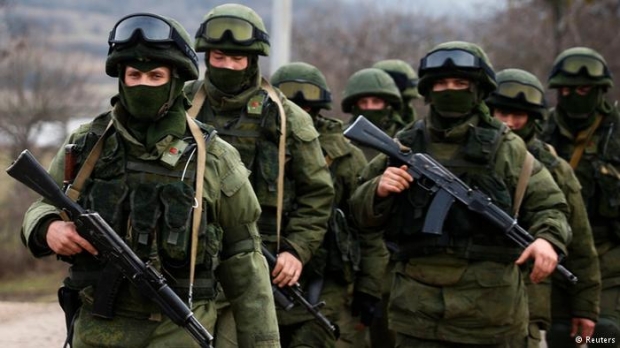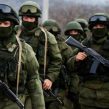
Kremlin Opens New Phase in Its War Against Ukraine
Publication: Eurasia Daily Monitor Volume: 12 Issue: 120
By:

Moscow is growing impatient with Ukraine’s unwillingness to legalize the Donetsk and Luhansk “people’s republics” and rewrite Ukraine’s constitution to their and Moscow’s satisfaction. The Minsk Two armistice, imposed on Ukraine on February 12, envisages that political process to be completed by December of this year (2015).
That, however, is conditional on a complete, durable and verified ceasefire in the field. And, since Ukraine is unwilling to sacrifice its sovereignty under the political terms of the armistice, Russia’s proxies continue hostilities in the field with variable intensity levels. Moscow aims thereby to coerce Kyiv into implementing the political terms of the armistice. But in breaching the ceasefire on a daily basis, Moscow and its proxies are demonstrably not meeting the precondition (see above) to the political process they want to impose on Ukraine.
The Kremlin is taking a number of steps with the aim of breaking or circumventing this political deadlock. Moscow also seems to be in the process of reviewing its political objectives in a more ambitious vein toward Ukraine.
Addressing the participants in the recent St. Petersburg International Economic Forum, President Vladimir Putin laid out a two-fold proprietary claim to Ukraine on Russia’s behalf. The second of these claims is new in this form: a claim to Ukraine’s future. “Ultimately, one way or another, Russia and Ukraine are fated to share their future together” (applause in the hall). Although Ukraine has a right to choose, Putin went on, “we are linked by common technical, energy, transportation infrastructures. This is already a matter for Russia, it is a matter of our interests,” he warned (Interfax, June 20).
Putin’s other proprietary claim derives not from a vision of the future but a pseudo-historical one. He told the same international forum that “Russians and Ukrainians are one people, one ethnicity, with its [sic] own specificity, its [sic] own characteristics. We are also linked by the ability to speak with each other in one [sic] language.”
In the traditional reference terms of Russian nationalism, which Putin has adopted, subsuming the Ukrainian identity to the Russian one implies rejecting the basis for Ukrainian national statehood; portraying it as unnatural and temporary, ultimately fated for amalgamation with the Russian state, as Putin already implied in this year’s telephone conversation with Russia’s populace (see EDM, April 23, 24).
Seen in this light, Moscow’s activating or suspending the Novorossiya project (which targets eight Ukrainian provinces), or shifting from support of the outright secession of Donetsk-Luhansk to “shoving” them back into Ukraine, on constitutional terms that would cripple Ukraine, appear as tactical moves. The Kremlin’s ultimate target, whether for reabsorbing or for disabling, is Ukraine as such—while biting off territorial chunks along the way, depending on circumstances (Debaltseve in February was the most recent case).
In his St. Petersburg remarks, Putin addressed four immediate demands to Ukraine: 1) change the constitution to de-centralize the country’s administrative-territorial system; 2) adopt and begin applying a special status for Donetsk-Luhansk (the current proposal would incapacitate the state); 3) validate local elections to be held in Donetsk-Luhansk (to legitimize and legalize the “people’s republics”); and 4) start financing social expenditures and reconstruction in those territories.
Ukraine is supposed to implement these demands through direct negotiations with Donetsk and Luhansk; i.e., to their satisfaction (if dissatisfied, they and Moscow would undoubtedly claim that Ukraine has refused to deliver). These are indeed political stipulations of the Minsk armistice. However, their implementation is sequenced to follow after a durable and verified ceasefire would have taken hold (see above). Putin is now reversing that sequence.
Moreover, Putin hinted that Russia would continue arming Donetsk-Luhansk forces, until Ukraine complies with those political demands: “In regional conflicts everywhere, the belligerents always find weapons somewhere. This is also the case in eastern Ukraine. But, if the situation is resolved politically, weapons would not be necessary. What is necessary is goodwill and entering into a direct dialogue [by Kyiv with Donetsk-Luhansk].”
Similarly, Nikolai Patrushev, Secretary of Russia’s Security Council, has publicly hinted that Moscow would continue facilitating the cross-border flow of Russian fighters into Ukraine, until Kyiv concedes on political issues: “There are no terrorist groups in Donetsk and Luhansk. Everything can be resolved without civil war, by complying with the Minsk agreement. But it is not being complied with. Russian Federation citizens go to fight in Donbas. We are not calling or rewarding people [to do this]. But it is impossible to prevent this. Emotions are at work, men go there to join up… Ukraine does not want to negotiate with the representatives of those armed groups [opolchenie]. But it must do so. And we cannot close that border. What, do you want us to impose a blockade there ?” (Kommersant, June 22).
Thus, Moscow is opening a new phase in its war against Ukraine. Military intimidation is more overt, the threat to continue underwriting proxy warfare more brazen. The Kremlin wants to change the Minsk armistice unilaterally by reversing the sequence of implementing its provisions. That document imposes political concessions on Ukraine, conditional on Russia stopping the hostilities. Since Ukraine resists, Russia is now pressuring Kyiv to deliver those concessions unconditionally.
Some officials at the European Commission in Brussels are asking Ukraine to meet Moscow’s demand: namely, start complying with the political terms of the Minsk armistice, no longer expecting Russia to comply with the military terms first (Ukrayinska Pravda, June 24, 25). Undoubtedly, Moscow had counted on this effect with those members of this Commission.




